新概念英语第一册语法知识点之情态动词的使用
新概念英语第一册重点语法知识点
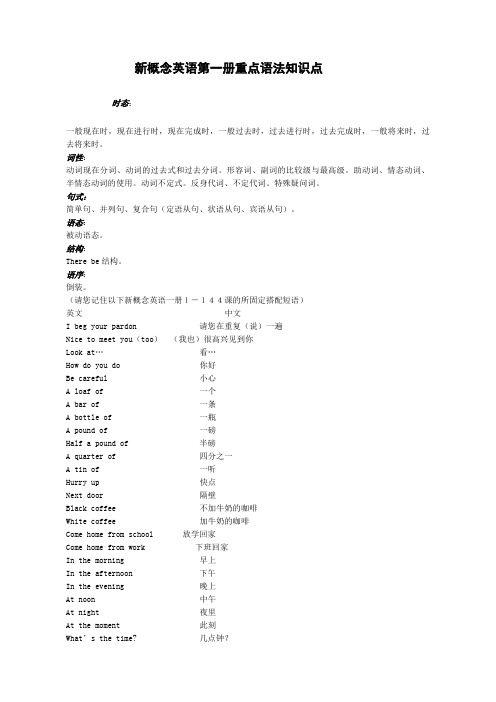
新概念英语第一册重点语法知识点时态:一般现在时,现在进行时,现在完成时,一般过去时,过去进行时,过去完成时,一般将来时,过去将来时。
词性:动词现在分词、动词的过去式和过去分词。
形容词、副词的比较级与最高级。
助动词、情态动词、半情态动词的使用。
动词不定式。
反身代词、不定代词。
特殊疑问词。
句式:简单句、并列句、复合句(定语从句、状语从句、宾语从句)。
语态:被动语态。
结构:There be结构。
语序:倒装。
(请您记住以下新概念英语一册1-144课的所固定搭配短语)英文中文I beg your pardon 请您在重复(说)一遍Nice to meet you(too)(我也)很高兴见到你Look at…看…How do you do 你好Be careful 小心A loaf of 一个A bar of 一条A bottle of 一瓶A pound of 一磅Half a pound of 半磅A quarter of 四分之一A tin of 一听Hurry up 快点Next door 隔壁Black coffee 不加牛奶的咖啡White coffee 加牛奶的咖啡Come home from school 放学回家Come home from work 下班回家In the morning 早上In the afternoon 下午In the evening 晚上At noon 中午At night 夜里At the moment 此刻What’s the time?几点钟?Come upstairs 上楼Come downstairs 下楼Hundreds of…数以百计的…On the way home 在回家的途中This morning 今天早晨This afternoon 今天下午This evening 今天晚上tonight 今天夜里Yesterday morning 昨天早晨Yesterday afternoon 昨天下午Yesterday evening 昨天晚上Last night 昨天夜里The day before yesterday in the morning 前天早晨The day before yesterday in the afternoon 前天下午The day before yesterday in the evening 前天晚上The night before last 前天夜间A low mark 分数很底A high mark 分数很高She said to herself 她心中暗想The way to…到…的走法In fashion 流行的,时髦的I’m afraid…我恐怕…I’m sure…我确信,我肯定…A lot of 许多(用于肯定句)At all 丝毫、更本、一点也不Going on holiday 度假Have been to…到过…All the time 一直,始终Have been to…到过…Drive into…撞倒…For sale 供出售、出售Have the last word 英国皇家空军Return ticket 往返票Next door to…与…相邻,在…隔壁In five hours’time在五小时之后。
新概念英语第一册语法点梳理

新概念一共144课,其中单课为课文,双课为语法和练习。
整本书是以单数课为正课,并附带有插图而双数课则是针对单数课所讲的内容有针对性地进行练习,从此出展现出整个新概念一教材区别于其他教材的独特之处。
以下是对新概念一整本教材的理解和剖析,以供各位对整个课本的理解和把握上参考和借鉴。
首先根据课本中出现的时态来分析:本册书的语法出现层次性和规律性是很强的,首先我们先来整本书中都出了哪些时态,这些时态的具体分布和讲解时我们大家需要注意的递进性。
Lesson 31—34 现在进行时Lesson 37—40 第一次出现be going to 的将来时Lesson 51—56 一般现在时Lesson 67—76 为一般过去式Lesson 83—90 为现在完成时Lesson 91—96 为一般将来时(will)Lesson 117—118 过去进行时Lesson 119—120 过去完成时除去前面所有时态和句型所占据的76课我们一起来看一下以下的68课,每一课小的语言点,语法点都是在什么地方,应该用什么样的方式来讲解。
新概念一的每一个单课的重点都是出现双课的标题和课后的练习题里面。
Lesson1—2语言点:与陌生人说话或引起别人的注意。
Excuse me. Yes? Pardon? Thank you very much.语法点:主系表结构this为主语,名词做表语1的一般疑问句以及它的肯定回答。
Is this your handbag? Yes, it is.Lesson 5—6语言点:如何介绍别人。
This is Miss Sophie Dupont. Nice to meet you.语法点:主语为第三人称单数的主系表结构。
She is French. He is German. It’s a Volvo.(L6) a/an 的使用。
Lesson 7—8语言点:如何自我介绍和相互认识。
语法点:主语为第二人称的主系表结构。
强烈推荐—新概念英语第一册语法点完全梳理(最完全版)
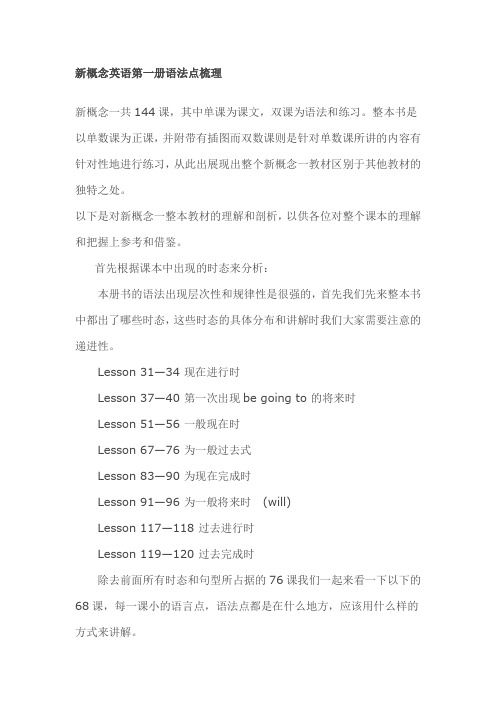
新概念英语第一册语法点梳理新概念一共144课,其中单课为课文,双课为语法和练习。
整本书是以单数课为正课,并附带有插图而双数课则是针对单数课所讲的内容有针对性地进行练习,从此出展现出整个新概念一教材区别于其他教材的独特之处。
以下是对新概念一整本教材的理解和剖析,以供各位对整个课本的理解和把握上参考和借鉴。
首先根据课本中出现的时态来分析:本册书的语法出现层次性和规律性是很强的,首先我们先来整本书中都出了哪些时态,这些时态的具体分布和讲解时我们大家需要注意的递进性。
Lesson 31—34 现在进行时Lesson 37—40 第一次出现be going to 的将来时Lesson 51—56 一般现在时Lesson 67—76 为一般过去式Lesson 83—90 为现在完成时Lesson 91—96 为一般将来时(will)Lesson 117—118 过去进行时Lesson 119—120 过去完成时除去前面所有时态和句型所占据的76课我们一起来看一下以下的68课,每一课小的语言点,语法点都是在什么地方,应该用什么样的方式来讲解。
在这里告诉学员新概念一的每一个单课的重点都是出现双课的标题和课后的练习题里面。
Lesson1—2语言点:与陌生人说话或引起别人的注意。
Excuse me. Yes? Pardon? Thank you very much.语法点:主系表结构this为主语,名词做表语1的一般疑问句以及它的肯定回答。
Is this your handbag? Yes, it is.Lesson 5—6语言点:如何介绍别人。
This is Miss Sophie Dupont. Nice to meet you.语法点:主语为第三人称单数的主系表结构。
She is French. He is German. It’s a Volvo.(L6)a/an 的使用。
Lesson 7—8语言点:如何自我介绍和相互认识。
新概念英语第一册各课语法知识汇总
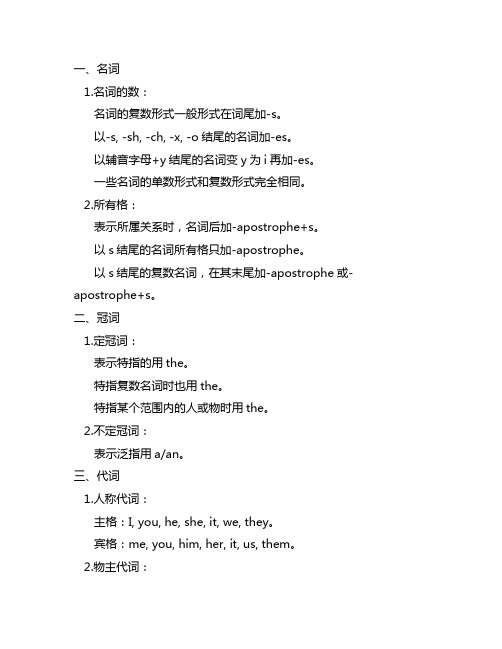
一、名词1.名词的数:名词的复数形式一般形式在词尾加-s。
以-s, -sh, -ch, -x, -o结尾的名词加-es。
以辅音字母+y结尾的名词变y为i再加-es。
一些名词的单数形式和复数形式完全相同。
2.所有格:表示所属关系时,名词后加-apostrophe+s。
以s结尾的名词所有格只加-apostrophe。
以s结尾的复数名词,在其末尾加-apostrophe或-apostrophe+s。
二、冠词1.定冠词:表示特指的用the。
特指复数名词时也用the。
特指某个范围内的人或物时用the。
2.不定冠词:表示泛指用a/an。
三、代词1.人称代词:主格:I, you, he, she, it, we, they。
宾格:me, you, him, her, it, us, them。
2.物主代词:形容词性物主代词:my, your, his, her, its, our, their。
名词性物主代词:mine, yours, his, hers, its, ours, theirs。
3.指示代词:this, that, these, those。
4.不定代词:some, any, no, every, each, many, much, few, little。
四、形容词1.形容词的用法:在名词前作定语。
在系动词之后作表语。
2.比较级和最高级:比较级:比较两者时,用比较级。
最高级:表示三者或三者以上之间的比较。
五、动词1.动词的三单形式:一般情况,动词第三人称单数在末尾加-s。
以辅音字母加y结尾的动词变y为i再加-es。
直接在词尾加-es的动词。
2.动词的现在进行时:am/is/are+动词的现在分词。
3.行为动词的过去式:动词过去式变化规则有规则动词和不规则动词。
六、副词1.副词的用法:修饰动词、形容词、副词。
表示时间、地点、原因、目的等。
2.比较级和最高级:副词比较级和最高级的构成。
七、介词1.介词的基本用法:表示方位、时间、原因、目的等。
新概念英语第一册语法知识点总结
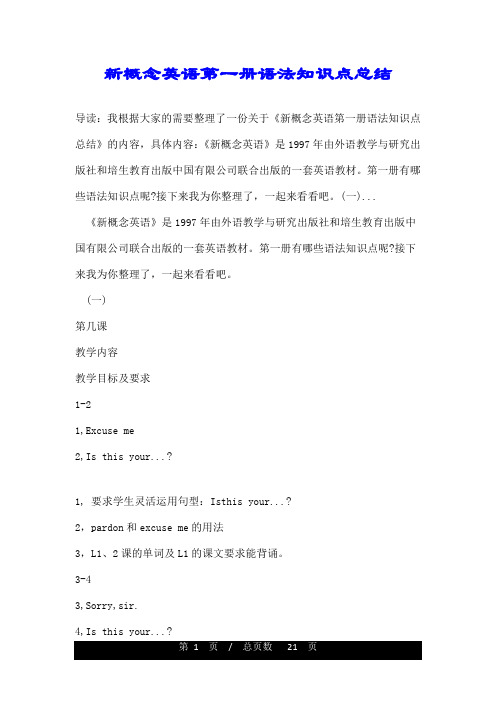
新概念英语第一册语法知识点总结导读:我根据大家的需要整理了一份关于《新概念英语第一册语法知识点总结》的内容,具体内容:《新概念英语》是1997年由外语教学与研究出版社和培生教育出版中国有限公司联合出版的一套英语教材。
第一册有哪些语法知识点呢?接下来我为你整理了,一起来看看吧。
(一)...《新概念英语》是1997年由外语教学与研究出版社和培生教育出版中国有限公司联合出版的一套英语教材。
第一册有哪些语法知识点呢?接下来我为你整理了,一起来看看吧。
(一)第几课教学内容教学目标及要求1-21,Excuse me2,Is this your...?1, 要求学生灵活运用句型:Isthis your...?2,pardon和excuse me的用法3,L1、2课的单词及L1的课文要求能背诵。
3-43,Sorry,sir.4,Is this your...?1, 继续巩固句型:Isthis your...?2,新句型:祈使句My____, please.否定句This is(not)____.3,L3、4课的单词及L3的课文要求背诵5-65,nice tomeet you6, What make is it?1, 主语为第三人称单数的主系表结构,She/ He/I t is...2,了解一些常见国籍的拼读3,This is ...(一般用于将某人介绍给他人的句式)4,Nice tomeet you.(用于初次与朋友、同学见面的问好)5,认知一些汽车的品牌6,国籍、汽车品牌要求会认读,其他单词及课文要求背诵7-87,Are you a teacher?8,Whats your job?1, 重点句型:Are you ...?/ Whats your job?/ What nationality are you? Im...(介绍自己:名字,国籍以及职业等)2,I am 的缩写(Im)3,不定冠词a,an9-109, How are you today?10, Look at...1,重点句型:How are you?(朋友或相识的人之间见面时的寒暄话)2,如何问候他人(Howis ...?)3,nice tosee you .(见面时的客气话)4,Look at...(看...)。
新概念英语第一册语法综述 43-48

新概念英语第一册语法综述(LESSON43-LESSON48)Part 11、情态动词can:1)情态动词是有意义的助动词的一种,当然不能单独使用。
情态动词没有人称与时态的变化,后面跟动词原型。
情态动词用于构成否定句和疑问句。
can 能,会Can you speak English? 你会说英语么?can 可以代替mayCan I use your bike? 我可以用你的车么?can 表示“可能性”,常用于否定句或疑问句中Can it be true? 这会是真的么?can 的句型:肯定句:He can make the tea.否定句:He can’t make the tea.一般疑问句:Can he make the tea? Yes, he can. No, he can’t.特殊疑问句:What can he do?2)could也可以表示请求,语气更加委婉,主要用于疑问句,不可用于肯定句,答语应用can (即could不能用于现在时态的简略答语中)。
比如:Could I come to see you tomorrow? Yes,you can.3)can表示能力时,还可用于be able to代替。
比如:I`ll not be able to come this afternoon.Part 21、at the butcher’s 在肉店方位副词at与in的区别是,at和in在…里;但at表示的地方较小,而in表示的地方很大,例:at the school at homein China in Asia2、butcher’s 是butcher’s shop的简写,还有例子如hairdresser’s(shop) my mother’s(house)3、What about some steak? 如果疑问句中希望得到对方的肯定回答,那么也可以使用some,如:Would you like some biscuit? 你希望来一些饼干么What about some steak? 来点牛排怎么样?4、To tell you the truth, Mrs. Bird. 动词不定式作插入语。
新概念英语第一册语法点梳理

新概念一共144课,其中单课为课文,双课为语法和练习。
整本书是以单数课为正课,并附带有插图而双数课则是针对单数课所讲的内容有针对性地进行练习,从此出展现出整个新概念一教材区别于其他教材的独特之处。
以下是对新概念一整本教材的理解和剖析,以供各位对整个课本的理解和把握上参考和借鉴。
首先根据课本中出现的时态来分析:本册书的语法出现层次性和规律性是很强的,首先我们先来整本书中都出了哪些时态,这些时态的具体分布和讲解时我们大家需要注意的递进性。
Lesson 31—34 现在进行时Lesson 37—40 第一次出现be going to 的将来时Lesson 51—56 一般现在时Lesson 67—76 为一般过去式Lesson 83—90 为现在完成时Lesson 91—96 为一般将来时(will)Lesson 117—118 过去进行时Lesson 119—120 过去完成时除去前面所有时态和句型所占据的76课我们一起来看一下以下的68课,每一课小的语言点,语法点都是在什么地方,应该用什么样的方式来讲解。
新概念一的每一个单课的重点都是出现双课的标题和课后的练习题里面。
Lesson1—2语言点:与陌生人说话或引起别人的注意。
Excuse me. Yes? Pardon? Thank you very much.语法点:主系表结构this为主语,名词做表语1的一般疑问句以及它的肯定答复。
Is this your handbag? Yes, it is.Lesson 5—6语言点:如何介绍别人。
This is Miss Sophie Dupont. Nice to meet you.语法点:主语为第三人称单数的主系表结构。
She is French. He is German. It’s a Volvo.(L6) a/an 的使用。
Lesson 7—8语言点:如何自我介绍和相互认识。
语法点:主语为第二人称的主系表结构。
新概念英语第一册第63-64课重点语法
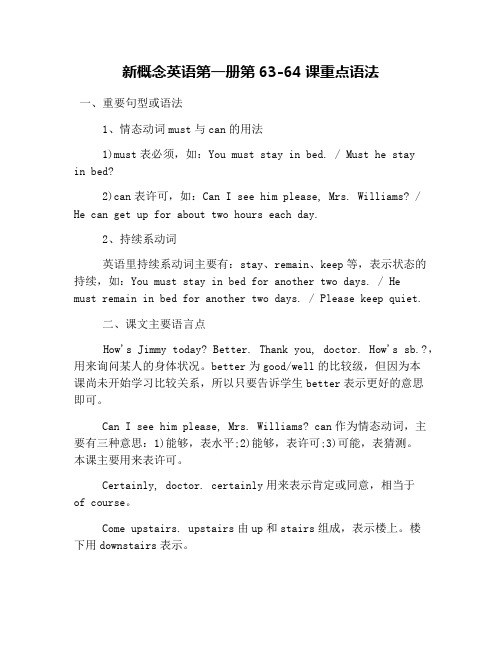
新概念英语第一册第63-64课重点语法一、重要句型或语法1、情态动词must与can的用法1)must表必须,如:You must stay in bed. / Must he stayin bed?2)can表许可,如:Can I see him please, Mrs. Williams? / He can get up for about two hours each day.2、持续系动词英语里持续系动词主要有:stay、remain、keep等,表示状态的持续,如:You must stay in bed for another two days. / Hemust remain in bed for another two days. / Please keep quiet.二、课文主要语言点How's Jimmy today? Better. Thank you, doctor. How's sb.?,用来询问某人的身体状况。
better为good/well的比较级,但因为本课尚未开始学习比较关系,所以只要告诉学生better表示更好的意思即可。
Can I see him please, Mrs. Williams? can作为情态动词,主要有三种意思:1)能够,表水平;2)能够,表许可;3)可能,表猜测。
本课主要用来表许可。
Certainly, doctor. certainly用来表示肯定或同意,相当于of course。
Come upstairs. upstairs由up和stairs组成,表示楼上。
楼下用downstairs表示。
You look very well, Jimmy. well在此用作形容词,表示身体好的。
You are better now, but you must'nt get up yet.not...yet,表示仍然不。
mustn't是must的否定形式之一,表示禁止、不能;must还有一种否定形式为needn't或don't have to,表示不必。
新概念第一册61课~72课语法知识点总结

61-64课:•重点句型:What’s the matter with…?用于询问他人的身体状况,医生在询问病人病情的时候常用这个表达方式。
with后面可以接人称代词,也可以接名词,如:What’s the matter with your sister?What’s the matter with Lily?What’s the matter with your cat?但要注意,with后面如果接人称代词的时候,一定要使用人称代词的宾格,如:What’s the matter with him?What’s the matter with her?和这个句型意思相同的另一种说法是:What’s wrong with…?这个说法需要注意的是:wrong前面没有the。
with后面也同样要接人称代词的宾格和名词。
•情态动词must的用法:must有“必须”、“一定”的意思,表示一种义务性或强制性,还表示强烈的劝告,如:You must finish your homework on time.(你必须按时完成作业。
)由于must是情态动词,所以它的用法和情态动词can是一样的,我们可以对照can 的用法来学习must的用法。
肯定句We must go now.否定句You mustn’t eat rich food.一般疑问句Must I clean the room now? Yes, you must. / No, you needn’t.特殊疑问句What must I do to help you?肯定句My brother can drive.否定句He can’t be at home.一般疑问句Can you help me?Yes, I can. / No, I can’t.特殊疑问句What can I do for you?通过对比,我们得知,凡是情态动词,后面都要接原形动词,在变为否定句的时候,要直接在情态动词后面加not,变为疑问句时,要把情态动词提前。
新概念英语第一册语法知识点之情态动词的使用
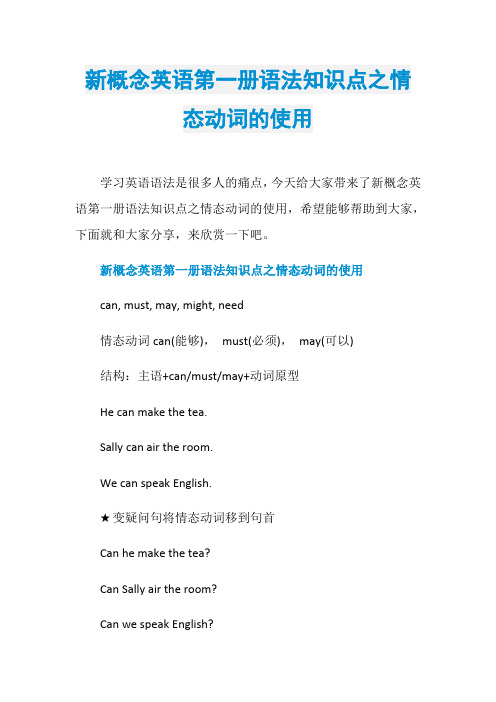
新概念英语第一册语法知识点之情态动词的使用学习英语语法是很多人的痛点,今天给大家带来了新概念英语第一册语法知识点之情态动词的使用,希望能够帮助到大家,下面就和大家分享,来欣赏一下吧。
新概念英语第一册语法知识点之情态动词的使用can, must, may, might, need情态动词can(能够),must(必须),may(可以)结构:主语+can/must/may+动词原型He can make the tea.Sally can air the room.We can speak English.★变疑问句将情态动词移到句首Can he make the tea?Can Sally air the room?Can we speak English?★变否定句在情态动词后面加notHe cannot make the tea.Sally cannot air the room.We cannot speak English.★肯定回答及否定回答Yes, he can. No, he cannot.Yes, she can. No, she cannot.Yes, we can. No, we cannot.★特殊疑问句:What can you do?(必背)注意:情态动词的句子没有第三人称单数的变化,不要在情态动词或动词后面加S。
1)Must/have to的区别must 表示必须,是主观上觉得应该做,have to是不得不,是由于客观条件逼迫的必要要做must 只能用在表示现在和将来的句子里,而have to do可以用在任何时态2)must, may, might表示猜测:must do 表示对现在事实的猜测must have done表示对过去事实的猜测must have been doing 表示对过去正在进行的事实的猜测may/might do, may/might have done表示没有任何事实依据的猜测,might的可能性更小。
新概念英语第1册语法知识点

【导语】新概念英语⽂章短⼩精悍,语句幽默诙谐,语法全⾯系统。
适合各个阶层的⼈群学习参考。
相信有了新概念英语,你也可以成为“⼤神”级别的⼈物!还在等什么?快来加⼊学习吧!⽆忧考⼩编与您⼀起学习进步!新概念英语第1册语法知识点:词法 ⼀、动词:(表⽰动作或状态等。
) 1、记住以下常见系动词 Appear Be Become Fall Feel Get Go Grow Keep Look Prove Remain Rest Run Seem Smell Sound Stay Taste Rurn 2、记住以下常见助动词 Be Have Do Will Sould Shall Should 3、记住以下常见情态动词 Can Could May Might Must Ought 4、记住以下常见半情态动词 Need Dare Be able to Have(got)to Had better(best) Used to ⼆、冠词(⽤在名词前帮助说明其词义) 三、名词(表⽰⼈或事物的名称) 四、代词(⽤来代替名词或数词等,包含反⾝代词) 五、形容词(⽤来修饰名词或代词) 六、副词(⽤来修饰动词、形容词、或副词) 七、介词(⽤在名词、代词等前⾯,表⽰与别的词的关系) ⼋、数词(表⽰数⽬或顺序) 九、连词(⽤来加接词与词或句与句) ⼗、感叹词(表⽰说话时的感情或⼝⽓)新概念英语第1册语法知识点:词法规则 ⼀、可数名词的复数规则变化 1、⼀般情况下未尾加“s”。
2、以x,ss,sh,ch,x结尾的名词加“es”。
3、以ce,se,ze,(d)ge结尾的词加“s”。
4、以辅⾳字母+y结尾的词,变“y”为“i”在加“es”。
5、以元⾳字母+y结尾的词,直接加“s”。
6、以f,fe结尾的名词⼀般变“f”或“fe”为“v”在加“es”。
(以f或fe结尾的部分名词可直接加“s”) 7、以o结尾的名词⼀般加“s”。
新概念英语第1册第129-130课重点语法

⼀、重要句型及语法 1、情态动词 本课仍然是有关情态动词表猜测的⽤法,侧重点的是must和can't对过去发⽣的动作或状态的猜测,其结构基本为:must/can't have been/done/been doing。
如: You must have been driving at seventy miles an hour. I can't have been. I must have been dreaming. ⼆、课⽂主要语⾔点 Look, Gary! That policeman's waving to you. He wants you to stop. 1)当look被⽤作提⽰语时,其后的句⼦的谓语动词经常要采⽤现在进⾏时。
2)wave to sb.,向某⼈招⽣⽰意。
3)want如果后接动词有两种⽤法,即sb. want to do sth.和sb. want sb. else to do sth.。
前者表⽰某⼈⾃⼰想做什么,⽽后者表⽰某⼈想要其他⼈做什么。
注意对⽐:He wants to stop. vs. He wants you to stop. Where do you think you are? On a race track? You must have been driving at seventy miles an hour. 1)“Where do you think you are?”中的do you think后⾯接的是where引导的疑问句。
注意本句其实是个反诘句,不需要回答的,注意朗读时语⽓要把警察强烈的责备语⽓读出来。
2)“On a race track?”是个省略疑问句,其完整形式为:“Do you think you are on a race track?”。
3)an hour中的an不是表⽰数量,⽽是表单位,意思为“每...”。
新概念英语第1册第79-80课重点语法
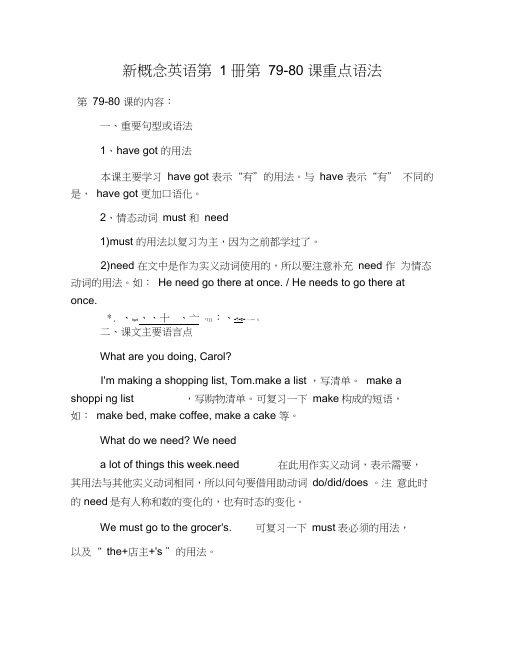
新概念英语第 1 册第79-80 课重点语法第79-80 课的内容:一、重要句型或语法1、have got 的用法本课主要学习have got 表示“有”的用法。
与have 表示“有” 不同的是,have got 更加口语化。
2、情态动词must 和need1)must 的用法以复习为主,因为之前都学过了。
2)need 在文中是作为实义动词使用的,所以要注意补充need 作为情态动词的用法。
如:He need go there at once. / He needs to go there at once.*. 、Iqzt 、、十、亠11 [ [ :、~7~T~—―-t二、课文主要语言点What are you doing, Carol?I'm making a shopping list, Tom.make a list ,写清单。
make a shoppi ng list ,写购物清单。
可复习一下make构成的短语,如:make bed, make coffee, make a cake 等。
What do we need? We needa lot of things this week.need 在此用作实义动词,表示需要,其用法与其他实义动词相同,所以问句要借用助动词do/did/does 。
注意此时的need是有人称和数的变化的,也有时态的变化。
We must go to the grocer's. 可复习一下must表必须的用法,以及“ the+店主+'s ”的用法。
We haven't got much tea or coffeeand we haven't got any sugar or jam.1)have got 中的have 是助动词,因为have got 在形式上其实就是现在完成时的用法。
其否定句和疑问句的句型转换就分别在have 后面加not 或把have 提前前面。
新概念英语第一册第131-132课重点语法

⼀、重要语法 1、情态动词 本课是有关情态动词may的⽤法的,它可以⽤来表⽰对过去、现在和将来时间发⽣的动作或状态的猜测。
如: We may go abroad. (将来) It may be cheaper. (现在) He may have been busy. (过去) ⼆、课⽂主要语⾔点 Where are you going to spend your holidays this year, Gary?1)可复习⼀下be going to do和will do的区别。
2)注意spend 的⽤法:spend sth. on sth. / (in) doing sth. We may go abroad. I'm not sure.1)注意may表⽰猜测时,可能性较⼩,所以Gary接着补充了I'm not sure。
2)go abroad,去国外。
注意提醒学⽣abroad的拼写,很容易被误拼为:abraod。
My wife wants to go to Egypt. I'd like to go there, too. We can't make up our minds.1)注意Egypt的拼写和发⾳。
2)make up one's mind,下定决⼼。
Will you travel by sea or by air? We may travel by sea.1)注意选择疑问句的回答不能⽤Yes/No。
2)可复习⼀下交通⼯具的介词⽤法,除了on foot,其他的⼀般都⽤by。
注意by sea相当于by ship,by air相当于by plane。
介词和交通⼯具间不能插⼊任何成分。
It's cheaper, isn't it? It may be cheaper, but it takes a long time.1)句中使⽤cheaper,其实是在⽐较by sea和by air的价格。
新概念一 情态动词

• 1 情态动词表示人的情感、状态或情绪变化 的一种助动词,它本身具有实际意义。 • 2 情态动词不能单独做谓语,只能和后面的 原形动词一起构成谓语。 • 3 情态动词没有人称和数格的变化。 • 4 含有情态动词的句子,否定句在它后面加 not,一般疑问句把它提前。
must 用法
• must是情态动词,表示“必须”、“应 当”,与have to相似,表示不可逃避的义 务。在说话人看来,没有选择的余地。但 must带有个人色彩,表示说话人的主观意 图。表示个人感情时通常用must。
• You must…(你必须……) 表示说话人说/认为……是必要的。 • You must open the window. • You mustn't open the window? • Must I open the window? • Yes, you must. • No, you needn't.
ห้องสมุดไป่ตู้
新概念第一册语法知识点汇总(完美版)
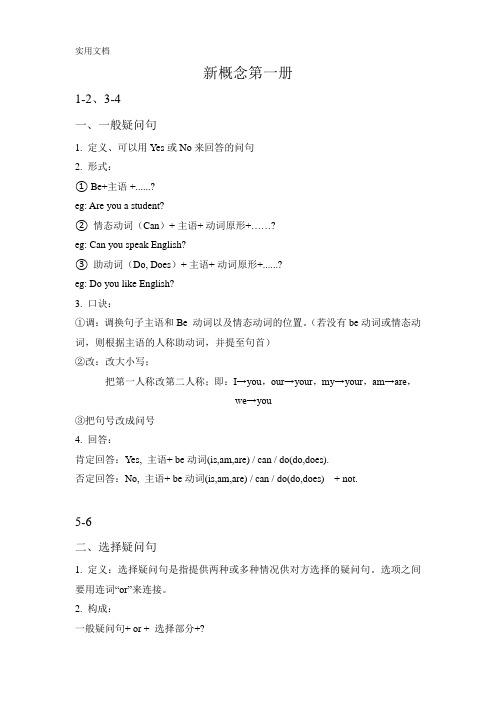
新概念第一册1-2、3-4一、一般疑问句1. 定义、可以用Yes或No来回答的问句2. 形式:① Be+主语 +......?eg: Are you a student?②情态动词(Can)+ 主语+ 动词原形+……?eg: Can you speak English?③助动词(Do, Does)+ 主语+ 动词原形+......?eg: Do you like English?3. 口诀:①调:调换句子主语和Be 动词以及情态动词的位置。
(若没有be动词或情态动词,则根据主语的人称助动词,并提至句首)②改:改大小写;把第一人称改第二人称;即:I→you,our→your,my→your,am→are,we→you③把句号改成问号4. 回答:肯定回答:Yes, 主语+ be动词(is,am,are) / can / do(do,does).否定回答:No, 主语+ be动词(is,am,are) / can / do(do,does) + not.5-6二、选择疑问句1. 定义:选择疑问句是指提供两种或多种情况供对方选择的疑问句。
选项之间要用连词“or”来连接。
2. 构成:一般疑问句+ or + 选择部分+?例:Are you a doctor or a teacher? 你是一个医生还是教师?Does he like this or that? 他喜欢这个还是喜欢那个?Is that coffee yours or hers? 这咖啡是你的还是她的?注:有时候选择部分会用“or not”来表示例:Are you ready or not (ready) ? 你准备好没有?Do you like the film or not? 你喜不喜欢这部电影?7-8、11-12、13-14三、特殊疑问句1. 含义:以特殊疑问词开头的疑问句。
2. 构成:特殊疑问词+一般疑问句+?3. 特殊疑问词总结:(1) what 什么(职业,姓名等)what day 星期几What day is it today? 几天星期几?what size 多大尺码What size are your shoes? 你的鞋码多大?what time 什么时间What time is it now? 现在几点了?what colour 什么颜色What color is your schoolbag? 你的书包是什么颜色?(2) when 什么时候(就时间提问)When will you visit Beijing? 你什么时候去北京玩?(3) where 什么地方(就地点提问)Where is your hometown? 你的家乡在哪?(4) who 谁(问人的身份,姓名等)Who is the girl in red dress? 穿着红裙子的女生是谁?(5) whose 谁的(whose + n.)Whose book is this?这是谁的书?(6) which 哪一个;哪些Which one is your sister ? 哪一个是你姐姐?(7) why 为什么(就原因提问,常用because回答)Why did you break the window?你为什么要打破窗户?(8) how 怎么样How do you go to school? 你怎么去学校?how many多少(提问可数名词数量)How many books do you have ?你有几本书?how much 多少(提问不可数名词数量)How much water is there in the glass?玻璃杯里有多少水?how much 多少钱(提问价格)How much is the ruler? 这把尺子多少钱?how old 几岁(提问年龄)How old are you? 你多少岁了?how long 多长(提问长度)How long is this ruler? 这把尺子有多长?多长时间(时间持续多久)How long do you go to school? 你去学校要多长时间?how often 多久一次(提问频率既单位时间发生多少次)how soon (还要多久时间才能开始或结束)How soon will he come back? 他多久才能回来?how heavy(提问有多重)How heavy is the luggage?这个行李箱有多重?9-10四、祈使句1. 定义:用于表达命令、请求、劝告、警告等的句子叫做祈使句。
新概念英语第1册第127-128课重点语法

新概念英语第1册第127-128课重点语法一、重要句型或语法1、情态动词本课开始学习的是情态动词表猜测的用法,本课侧重点的是must 和can't对现在发生的动作或状态的猜测。
如:It must be Karen Marsh, the actress.It can't be Conrad Reeves, the actor.二、课文主要语言点Can you recognize that woman, Liz? 1)此处的can表示的是“能够”。
2)recognize,认出。
注意其发音(尤其要注意其重音在第一个音节)和拼写。
I think I can, Kate.It must be Karen Marsh, the actress.1)注意I think I can后面省略了recognize that woman。
2)must be表对现在状态的肯定猜测。
注意must只有肯定形式才能表猜测,否定形式mustn't不能表猜测。
3)the actress(女演员),用作Karen Marsh的同位语,补充说明其身份。
注意actress的构词方式:act+ess,字母r是出于音节发音的需要而额外增加的。
I thought so. 可提问学生为什么此处的谓语动词think要用过去式thought(Kate想表达的是,她刚才就是这么想的,也就是说她刚才就认为那个女的应该就是Karen Marsh。
这是过去的事情,所以动词要用一般过去时。
)Who's that beside her?That must be Conrad Reeves.1)beside,在旁边。
2)注意that的远指功能,即用来指代离说话较远的人或物。
3)本句中的must be也是对现在状态的肯定猜测。
Conrad Reeves, the actor? It can't be. 1)注意the actor用作Conrad Reeves的同位语,补偿说明其身份。
新概念英语第一册语法知识点之情态动词的使用2篇

新概念英语第一册语法知识点之情态动词的使用新概念英语第一册语法知识点之情态动词的使用精选2篇(一)情态动词是一种特殊的动词,用来表示说话人对某个动作或状态的态度、推测、建议、义务、能力等。
1. Can:- 表示能力或技能,常用于描述具体的能力,如Can you swim?(你会游泳吗?);- 用于请求、建议或邀请,如Can you please help me?(你能帮我吗?)。
2. Could:- 表示过去的能力或技能,常用于故事或描述过去的事件,如When I was younger, I could run faster(我年轻的时候跑得更快);- 用于请求、建议或邀请,比can更为客气,如Could you please pass me the salt?(你能给我递盐吗?)。
3. May:- 表示允许或询问许可,如May I use your computer?(我可以使用你的电脑吗?);- 表示可能性,如It may rain tomorrow(明天可能会下雨);- 用于委婉的请求,如May I have another cup of tea?(我可以再喝一杯茶吗?)。
4. Might:- 表示较小的可能性,比may更不确定,如He might be late(他可能会迟到);- 用于委婉的请求或建议,如Might I suggest another approach?(我可以建议另一种方法吗?)。
5. Must:- 表示义务或必要性,常用于表示必须的情况,如You must finish your homework(你必须完成作业);- 表示推测,用于表示肯定的推断,如He must be tired(他一定累了)。
6. Should:- 表示建议或期望,常用于表示客观上应该的情况,如You should get some rest(你应该休息一下);- 用于表示对现状的评价,如It should be ready by tomorrow(明天应该准备好了)。
(完整版)新概念英语1A知识点总结
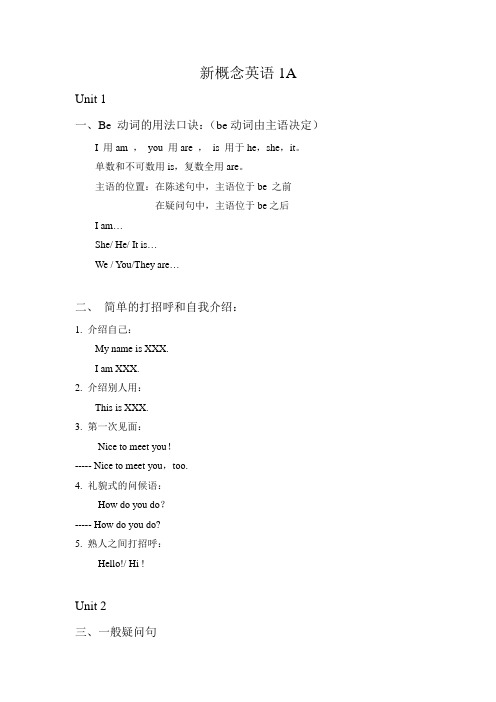
新概念英语1A Unit 1一、Be 动词的用法口诀:(be动词由主语决定)I 用am ,you 用are ,is 用于he,she,it。
单数和不可数用is,复数全用are。
主语的位置:在陈述句中,主语位于be 之前在疑问句中,主语位于be之后I am…She/ He/ It is…We / You/They are…二、简单的打招呼和自我介绍:1. 介绍自己:My name is XXX.I am XXX.2. 介绍别人用:This is XXX.3. 第一次见面:Nice to meet you!----- Nice to meet you,too.4. 礼貌式的问候语:How do you do?----- How do you do?5. 熟人之间打招呼:Hello!/ Hi !Unit 2三、一般疑问句1. 定义(什么叫做一般疑问句):可以用Yes或No来回答的问句。
2. 陈述句变一般疑问句步骤(怎么变?):①调:调换主语与be 的位置到句首。
②改:A:改写大小。
B:该人称:I(我)→you(你),we(我们)→you(你们),my (我的)→your(你的),am(用于I)→are(用于you等复数人称)C:将句号“.”改成问号“?”3. 回答:①肯定回答:Yes,主语+be.②否定回答:No,主语+be+not. (am与not不缩写)例:陈述句:This is my pen. 这是我的钢笔。
一般疑问句:Is this your pen? 这是你的钢笔吗?肯定回答:Yes, it is. 是的,这是我的钢笔。
否定回答:No, it is not(isn’t). 不,这不是我的钢笔。
4. Be动词的否定式:①:Be 的现在式:am , is , are②:Be 的过去式:was ,were③:否定式:is not= isn’t , are not=aren’t , am not无缩写形式四、冠词a/ an 的用法1. a + 以辅音发音开头的单词例:a hat , a man , a university [ˌju:nɪˈvɜ:səti]an + 以元音发音开头的单词例:an apple [ˈæpl] ,an orange [ˈɒrɪndʒ],an egg [eg],an uncle [ˈʌŋkl],an hour [ˈaʊə(r)]2. 单个字母出现在“Mr Li has one fox”中任何一个字母均用an例:an M an H an SUnit 3五、特问词的运用1. 特问词:What 问物(什么)How old 问年龄(多少岁)Who 问人(谁)How many/ much…?多少…?Whose 问谁的How 怎样What colour 问颜色Where 问哪里Which 哪一个(选择)When 问时间(什么时候)=what time2.例子① What is this?(问物)---- It is a bicycle. It is a silver bicycle.② Whose is this umbrella ?(问谁的)---- It’s William’s.③ What colour is Robert’s bicycle? (问颜色+问谁的)---- Robert’s bicycle is silver.六、对划线部分提问的做题技巧1. 选特问词。
新概念英语第一册语法知识点之情态动词的使用
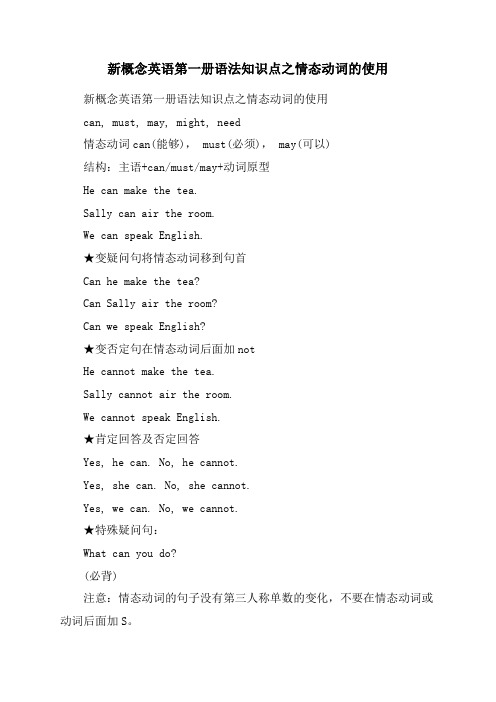
新概念英语第一册语法知识点之情态动词的使用新概念英语第一册语法知识点之情态动词的使用can, must, may, might, need情态动词can(能够), must(必须), may(可以)结构:主语+can/must/may+动词原型He can make the tea.Sally can air the room.We can speak English.★变疑问句将情态动词移到句首Can he make the tea?Can Sally air the room?Can we speak English?★变否定句在情态动词后面加notHe cannot make the tea.Sally cannot air the room.We cannot speak English.★肯定回答及否定回答Yes, he can. No, he cannot.Yes, she can. No, she cannot.Yes, we can. No, we cannot.★特殊疑问句:What can you do?(必背)注意:情态动词的句子没有第三人称单数的变化,不要在情态动词或动词后面加S。
1)Must/have to的区别must 表示必须,是主观上觉得应该做,have to是不得不,是由于客观条件逼迫的必要要做must 只能用在表示现在和将来的句子里,而have to do可以用在任何时态2)must, may, might表示猜测:must do 表示对现在事实的猜测must have done表示对过去事实的猜测must have been doing 表示对过去正在进行的事实的猜测may/might do, may/might have done表示没有任何事实依据的猜测,might的可能性更小。
can’t/couldn’t 表示不可能新概念第一册语法讲解:一般现在时1、含有be动词的句子He is a teacher.The girl is very beautiful.Tim and Jack are students.★变疑问句将be动词移到句首Is he a teacher?Is the girl very beautiful?Are Tim and Jack students?★变否定句在be动词后面加notHe is not a teacher.The girl is not very beautiful.Tim and Jack are not students.★肯定回答及否定回答Yes, he is. / No, he is not.Yes, she is. / No, she is not.Yes, they are. / No, they are not.2、不含有be动词的句子,即含有一般动词的句子。
- 1、下载文档前请自行甄别文档内容的完整性,平台不提供额外的编辑、内容补充、找答案等附加服务。
- 2、"仅部分预览"的文档,不可在线预览部分如存在完整性等问题,可反馈申请退款(可完整预览的文档不适用该条件!)。
- 3、如文档侵犯您的权益,请联系客服反馈,我们会尽快为您处理(人工客服工作时间:9:00-18:30)。
新概念英语第一册语法知识点之情态动词的使用can, must, may, might, need情态动词can(能够),must(必须),may(可以) 结构:主语+can/must/may+动词原型He can make the tea.Sally can air the room.We can speak English.★变疑问句将情态动词移到句首Can he make the tea?Can Sally air the room?Can we speak English?★变否定句在情态动词后面加notHe cannot make the tea.Sally cannot air the room.We cannot speak English.★肯定回答及否定回答Yes, he can. No, he cannot.Yes, she can. No, she cannot.Yes, we can. No, we cannot.★特殊疑问句:What can you do?(必背)注意:情态动词的句子没有第三人称单数的变化,不要在情态动词或动词后面加S。
1)Must/have to的区别must 表示必须,是主观上觉得应该做,have to是不得不,是由于客观条件逼迫的必要要做must 只能用在表示现在和将来的句子里,而have to do可以用在任何时态2)must, may, might表示猜测:must do 表示对现在事实的猜测must have done表示对过去事实的猜测must have been doing 表示对过去正在进行的事实的猜测may/might do, may/might have done表示没有任何事实依据的猜测,might的可能性更小。
can’t/couldn’t 表示不可能新概念第一册语法讲解:一般现在时1、含有be动词的句子He is a teacher.The girl is very beautiful.Tim and Jack are students.★变疑问句将be动词移到句首Is he a teacher?Is the girl very beautiful?Are Tim and Jack students?★变否定句在be动词后面加notHe is not a teacher.The girl is not very beautiful.Tim and Jack are not students.★肯定回答及否定回答Yes, he is. / No, he is not.Yes, she is. / No, she is not.Yes, they are. / No, they are not.2、不含有be动词的句子,即含有一般动词的句子。
(1)第三人称单数及单数名词He likes books.She likes him.The dog likes bones.★变疑问句在句首加does, 动词变为原型Does he like books?Does she like him?Does the dog like bones?★变否定句在主语及动词之间加doesn't, 动词变为原型,原句中的动词不再有第三人称变化。
He doesn't like books.She doesn't like him.The dog doesn't like bones.★肯定回答及否定回答:Yes, he does. / No, he doesn't.Yes, she does. / No, she doesn'tYes, it does. / No, it doesn't.注意:第三人称单数形式一般在动词后面加S,不要和名词复数混淆,变否定句或疑问句时名词复数没有任何变化。
(2)其他人称及复数名词I want to have a bath.We have some meat.The students like smart teachers.★变疑问句在句首加doDo you want to have a bath?Do we have any meat?Do the students like smart teachers?★变否定句在主语和动词之间加don't.You don't want to have a bath.We don't have any meat.The students don't like smart teachers.★肯定回答及否定回答Yes, I do. / No, I don't.Yes, we do. / No, we don'tYes, they do. / No, they don't.新概念第一册语法讲解:现在完成时现在完成时构成:主语+助动词have, has+过去分词用法:1) 表示过去发生的和现在有某种联系的动作,常和just, usually, already, since等时间副词连用。
I have just had lunch. (饱了,不用再吃了。
)He has had a cup of tea.(不渴了,不用再喝。
)They have already had their holiday. (不能再度假了。
)The boy has already read the book. (已经知道书的内容了,不用再看了。
)2) 询问别人是否做过某事一般用现在完成时:Have you finished your homework?Have you been to Beijing?Have he seen the film?3) 表示开始于过去并持续到现在的动作I have lived in Beijing for twenty years.I have worked for this school for 1 year.4) 表示一种经历,经验:去过…地方,做过…事情,经历过…事情I have never had a bath.I have never seen a film.I have never been to cinema.I have ever been to Paris.Have been to表示去过,have gone to 表示去了I have been to London.(人已经回来)He has gone to London.(人还在那里)5) 表示一种结果,一般不和时间副词联用I have lost my pen.I have hurt myself.He has become a teacher.She has broken my heart.句型变化:★变疑问句将助动词移到句首,变否定句在助动词后面加not.Have you lost your pen? I have not lost my pen.★肯定回答及否定回答Yes, I have. / No, I have not.★特殊疑问句What have you done?What has he done?一般过去时与现在完成时的区别:凡是有明确的表示过去的时间状语的句子为过去时。
注意:有些动词表示的动作有一个终点,不能再延续,因此不能和表示一段时间状语连用。
错:I’ve left Beijing for 3 days.对:I left Beijing 3 days ago. I have been away from being for 3 days.新概念英语第一册语法知识点:定语从句定语从句1.了解定语从句的构成,首先应了解一些相关的基本概念。
a.被修饰的名词等成分通常叫做先行词;b.连接先行词和定语从句的词为关系词。
2.定语从句由关系代词、关系副词和关系限定词三类关系词连接而成,这三种也将在定语从句讲解中一一说明。
定语从句讲解关系词的具体用法1.关系代词which,who,whom,that 和as2.关系代词,顾名思义,必有代替对象。
上述五个关系代词各有其具体指代对象,在从句中作相应的成分。
此外,它们引导的定语从句和先行词是形容词与名词的修饰关系。
例句及翻译例句1:Pumas are large,cat-like animals( that/which are found in America.)【译文】美洲狮是体形似猫的大型动物,产于美洲。
【注解】关系代词作从句主语,不可省略。
例句2:The house (that/which we built last year) is very attractive.【译文】我们去年建造的房子很讨人喜欢。
【注解】关系代词作从句宾语,可省略。
例句3:The novel (with/which most of you are familiar) has been adapted for thescreen.【译文】你们大多数都很熟悉的那部小说已被改编搬上了荧屏。
【注解】关系代词直接置于介词后作介词宾语,此时不可被that替换,也不可省略。
例句4:He was no longer the reckless young man( that/which he was two yearsago).【译文】他不再是两年前那个莽撞的小伙子了。
【注解】关系代词作从句表语,可省略;此外,先行词the young man代表一种状态,属物的范畴,不能用who来引导定语从句。
例句5:Migrant workers(to whom much more attention has been paid) strongly desirethat their wages should be duly paid.【译文】现在民工受到了社会更大的关注,他们强烈渴望自己的工资能够及时发放。
【注解】关系代词直接置于介词后作介词宾语,此时不可被who替换,也不可省略。
例句6:Such accommodations(as they could find) were generally expensive.【译文】他们能够找到的这些住所费用往往比较昂贵。
【注解】之所以选择关系代词as引导定语从句,是因为前面有such之故。
例句7:Such inns(as there were in the mountains) were generally poor.【译文】这些山区里的酒馆条件往往比较糟糕。
【注解】之所以选择关系代词as引导定语从句,是因为前面有such之故。
